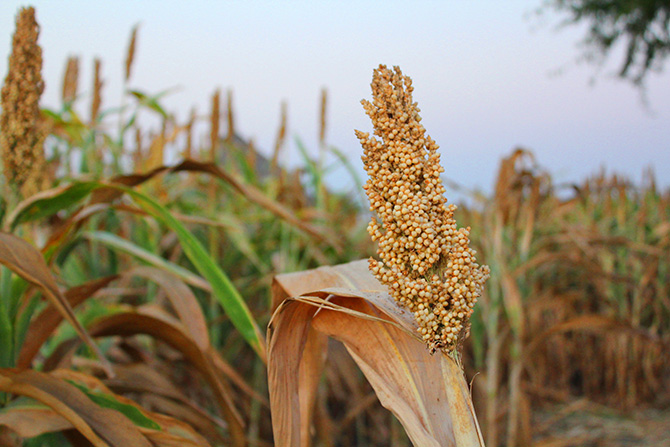
Mamadou Faye is a small-scale farmer in Pointe-Sarene, about 100 kilometers southern part of Dakar, Senegal. In 2015, thanks to our West Africa Agricultural Productivity Program (WAAPP), Mamadou went from its usual corn farming to sorghum seed production. He was able to grow healthy stalks of sorghum despite erratic rainfall.
Before planting sorghum, he used to plant maize. However irregular rainfall and poor seed quality produced paltry yields and low revenue. When he signed a contract with a cooperative run by Senegal’s Pastoral and Farmers Organizations' Network (Réseau des organisations paysannes et pastorales du Sénégal or RESOPP), he was provided with seeds of new varieties of sorghum developed by the West Africa Agricultural Productivity Program (WAAPP). These seeds promised to be drought resistant and have shorter cycles. According to Mamadou, they kept their promise.
“I work from 7am to 6pm in this field every day, fighting off monkeys and birds to save my crops because the sorghum is worth it. It’s an advantageous crop for me. If I had more land, I would definitely plant more,” explained Mr. Faye.
Under the seed production contract, Mamadou is bound to sell the sorghum seeds back to the cooperative for 300 FCFA the kilo, a price higher than that of the market (150 FCA). According to the local WAAPP agricultural advisor, Diegane Faye, farmers using these WAAPP certified seeds obtained a yield of 1.5 to 2 tons per hectare against 0.5 ton per hectare from local non-certified varieties. With the region receiving half the normal amount of rainfall (250mm instead of the usual 500mm) for this past harvest (2014), the aforementioned yield is remarkable – and lifesaving.
With agriculture becoming an increasingly risky business in Senegal and many other Sub-Saharan African countries, there is an urgent need to protect farmers from the ever increasing risks linked to weather variability, pests, diseases, drought, flooding.
Given these conditions, the WAAPP program coordinated by CORAF/WECARD is developing and implementing climate smart agriculture to sustain agricultural growth and subsequently, pave the way for poverty alleviation and economic growth, especially in agricultural-based countries where the correlation is high.
With these improved varieties, farmers are achieving high yields even during years where there is a rainfall deficit such as 2011 and 2014 where producers have increased the productivity by up to 60%. These varieties are helping famers build resilience to climate shocks and protect them against the negative consequences of crop failure that they were previously exposed to.







